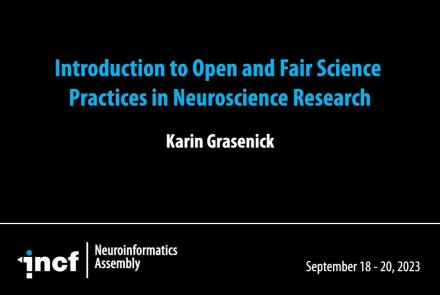This lecture provides an introduction to optogenetics, a biological technique to control the activity of neurons or other cell types with light.
Difficulty level: Beginner
Duration: 39:34
Speaker: : Adam Packer
This lesson continues with the second workshop on reproducible science, focusing on additional open source tools for researchers and data scientists, such as the R programming language for data science, as well as associated tools like RStudio and R Markdown. Additionally, users are introduced to Python and iPython notebooks, Google Colab, and are given hands-on tutorials on how to create a Binder environment, as well as various containers in Docker and Singularity.
Difficulty level: Beginner
Duration: 1:16:04
Speaker: : Erin Dickie and Sejal Patel
This lesson contains both a lecture and a tutorial component. The lecture (0:00-20:03 of YouTube video) discusses both the need for intersectional approaches in healthcare as well as the impact of neglecting intersectionality in patient populations. The lecture is followed by a practical tutorial in both Python and R on how to assess intersectional bias in datasets. Links to relevant code and data are found below.
Difficulty level: Beginner
Duration: 52:26
This lesson gives a description of the BrainHealth Databank, a repository of many types of health-related data, whose aim is to accelerate research, improve care, and to help better understand and diagnose mental illness, as well as develop new treatments and prevention strategies.
This lesson corresponds to slides 46-78 of the PDF below.
Difficulty level: Beginner
Duration: 1:12:25
Speaker: : Joanna Yu
This lecture covers the history of behaviorism and the ultimate challenge to behaviorism.
Difficulty level: Beginner
Duration: 1:19:08
Speaker: : Paul F.M.J. Verschure
This lecture covers various learning theories.
Difficulty level: Beginner
Duration: 1:00:42
Speaker: : Paul F.M.J. Verschure
This lecture covers a lot of post-war developments in the science of the mind, focusing first on the cognitive revolution, and concluding with living machines.
Difficulty level: Beginner
Duration: 2:24:35
Speaker: : Paul F.M.J. Verschure
Course:
Maximize Your Research With Cloud Workspaces is a talk aimed at researchers who are looking for innovative ways to set up and execute their life science data analyses in a collaborative, extensible, open-source cloud environment. This panel discussion is brought to you by MetaCell and scientists from leading universities who share their experiences of advanced analysis and collaborative learning through the Cloud.
Difficulty level: Beginner
Duration: 55:43
This lesson provides an introduction the International Neuroinformatics Coordinating Facility (INCF), its mission towards FAIR neuroscience, and future directions.
Difficulty level: Beginner
Duration: 20:29
Speaker: : Maryann Martone
This talk goes over Neurobagel, an open-source platform developed for improved dataset sharing and searching.
Difficulty level: Beginner
Duration: 13:37
Speaker: : Jean-Babtiste Poline
This video gives a brief introduction to the second session of talks from INCF's Neuroinformatics Assembly 2023.
Difficulty level: Beginner
Duration: 3:55
Speaker: : Trygve Leergard
This talk describes the relevance and power of using brain atlases as part of one's data integration pipeline.
Difficulty level: Beginner
Duration: 15:37
Speaker: : Timo Dickscheid
This talk discusses what are usually considered successful outcomes of scientific research consortia, and how those outcomes can be translated into lasting impacts.
Difficulty level: Beginner
Duration: 18:24
Speaker: : Anita Bandrowski
This talk discusses the BRAIN Initiative Cell Atlas Network (BICAN), taking a look specifically at how this network approaches the design, development, and maintenance of specimen and sequencing library portals.
Difficulty level: Beginner
Duration: 15:08
Speaker: : GQ Zhang
This final lesson of the course consists of the panel discussion for Streamlining Cross-Platform Data Integration session during the first day of INCF's Neuroinformatics Assembly 2023.
Difficulty level: Beginner
Duration: 50:16
Speaker: :
This brief video provides an introduction to the session "Is This FAIR?": Transparency in EDI, Career Development, & Management.
Difficulty level: Beginner
Duration: 4:50
Speaker: : Tanya Brown
In this lesson, you will learn about how team science unfolds in practice, as well as what are the standards and best practices used by teams, and how well these best practices function and support scientific output.
Difficulty level: Beginner
Duration: 15:21
Speaker: : Hannah Bayer
In this lesson, you will learn about approaches to make the field of neuroscience more open and fair, particularly regarding the integration of equality, diversity, and inclusion (EDI) as guiding principles for team collaboration.
Difficulty level: Beginner
Duration: 14:11
Speaker: : Karin Grasenick
This lesson discusses the topic of credit and contribution in open and FAIR neuroscience, looking through the respective lenses of systems, teams, and people.
Difficulty level: Beginner
Duration: 24:34
Speaker: : Tanya Brown
In this talk, you will hear about the challenges and costs of being FAIR in the many scientific fields, as well as opportunities to transform the ecology of the academic crediting system.
Difficulty level: Beginner
Duration: 14:56
Speaker: : Zefan Zheng
Topics
- Artificial Intelligence (6)
- Philosophy of Science (5)
- Provenance (2)
- protein-protein interactions (1)
- Extracellular signaling (1)
- Animal models (6)
- Assembly 2021 (29)
- Brain-hardware interfaces (13)
- Clinical neuroscience (17)
- International Brain Initiative (2)
- Repositories and science gateways (11)
- Resources (6)
- General neuroscience
(45)
- Neuroscience (9)
- Cognitive Science (7)
- Cell signaling (3)
- Brain networks (5)
- Glia (1)
- Electrophysiology (20)
- (-) Learning and memory (3)
- Neuroanatomy (17)
- Neurobiology (7)
- Neurodegeneration (1)
- (-) Neuroimmunology (1)
- Neural networks (4)
- Neurophysiology (22)
- Neuropharmacology (2)
- Synaptic plasticity (2)
- Visual system (12)
- Phenome (1)
- General neuroinformatics
(26)
- (-) Computational neuroscience (198)
- Statistics (2)
- Computer Science (16)
- Genomics (25)
- Data science
(24)
- Open science (53)
- Project management (7)
- Education (3)
- Publishing (4)
- Neuroethics (37)




















